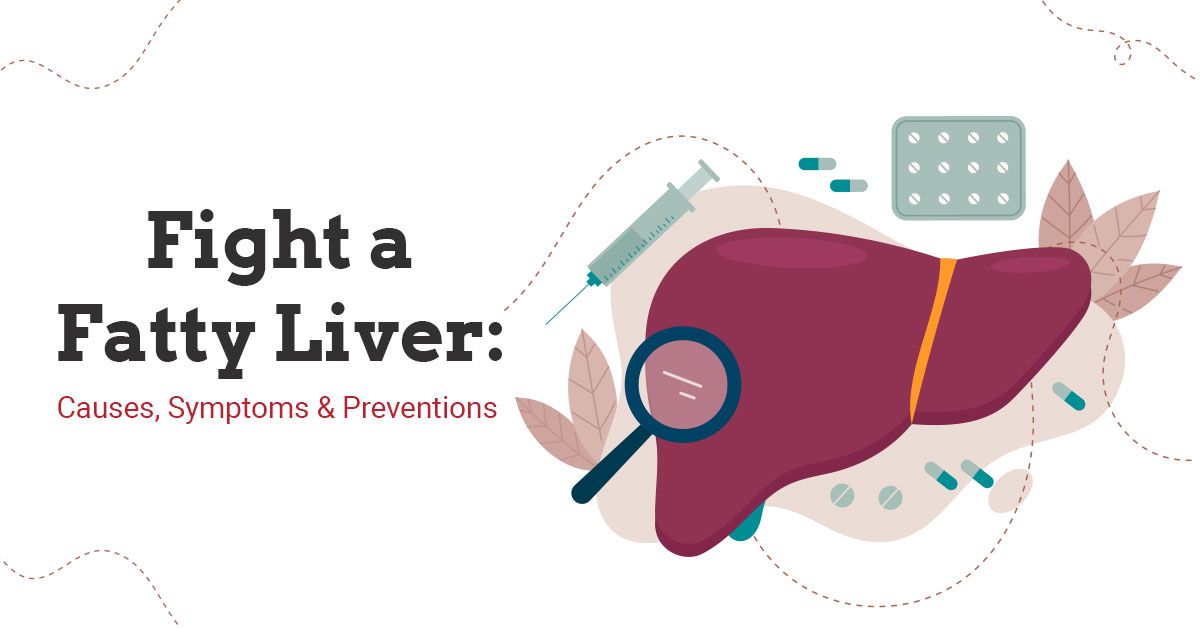
The function of the liver is to regulate the fat percentage in our bodies. The liver processes fats called lipoproteins from the blood and produce essential minerals for the body to function. When there is an imbalance in its function, fat droplets accumulate in the liver. It is normal for the liver to contain some fat, but if the fat accounts for more than 10% of the liver’s weight, it leads to a fatty liver and may result in serious complications. Although having a fatty liver may not cause any immediate harm, in the long run, that extra fat in the liver might make the liver vulnerable to further injuries such as inflammation and scarring.
Healthcare providers divide fatty liver disease into two types. Nonalcoholic fatty liver disease (NAFLD) where you just have fat but your liver isn’t damaged. On the other hand, there is nonalcoholic steatohepatitis (NASH) where you have fat in your liver, signs of inflammation and liver cell damage.
Causes
The most common causes of a fatty liver are:
- Consumption of large amounts of alcohol
- Obesity
- Metabolic abnormalities, such as excess body weight, insulin resistance (that can occur in a diabetic patient), and high levels of fats (triglycerides and cholesterol) in the blood
- Toxins
- Certain drugs, including corticosteroids, tamoxifen, and certain chemotherapy drugs
- Hereditary metabolic disorders
- Pregnancy
Symptoms of Fatty Liver
Fatty liver disease is sometimes called a silent liver disease as most people have no symptoms. If the liver is enlarged a lot there may be an ache or mild tenderness in the right upper abdomen. At least 80% of patients with a fatty liver do not develop any serious problems. The rest of the patients may develop complications like-
- Severe fatigue
- Weakness
- Weight loss
- Skin or eyes turning yellowish
- Spiderlike blood vessels on the skin
- Long-lasting itching
However, these symptoms can take years to develop.
Diagnosis of Fatty Liver
You can diagnose fatty liver after finding an abnormality on liver function tests, which are often done as part of standard blood tests. Another test that helps to detect it is an abdominal ultrasound. If you see raised concentrations of ALT (alanine aminotransferase) and AST (aspartate aminotransferase), it can be due to a fatty liver. Alternatively, your doctor may detect an enlarged liver while examining your abdomen. A biopsy of your liver is the only test that can definitively diagnose this disease, but other tests like ultrasound can be sufficient to conclude fatty liver disease.
Treatments of Fatty Liver
Fatty liver disease is mostly harmless but in rare cases, it can lead to serious complications, such as liver cirrhosis and liver cancer. That’s why it is important to treat the disease early in the condition when it can be improved and even reversed.
Maintaining healthy body weight and a proper diet are the best treatments for a fatty liver. Moreover, you should limit your consumption of alcohol. You should also avoid medicines that may affect your liver, such as some steroids.
If you are living with fatty liver disease, learn as much as you can about your condition and work closely with your medical team. Since many medications can harm your liver, always let all your health care providers know about any medications you are taking. Visit Regency Health today if you are facing any of the above symptoms.


 Call-an-Ambulance
Call-an-Ambulance



